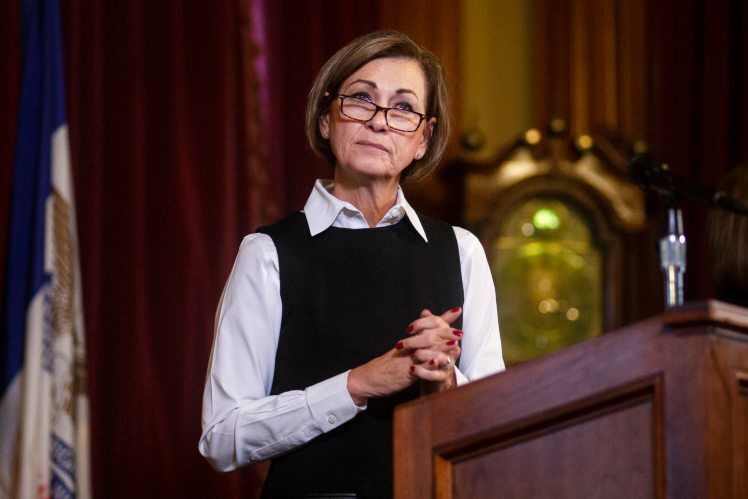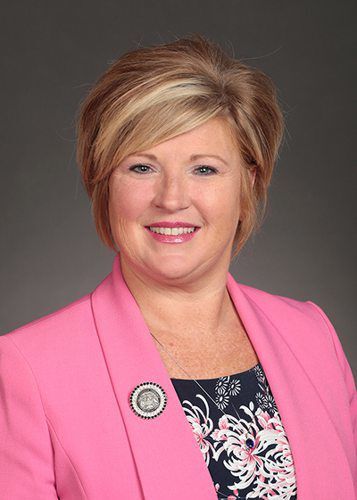Iowa Gov. Kim Reynolds on Thursday announced a grant program to help bars and restaurants hit hard by the COVID-19 pandemic.
She also announced an expansion to the next round of vaccination eligibility to include more older adults.
Restaurant relief
The Iowa Restaurant and Bar Relief Grant Program will provide one-time grants of up to $25,000 to businesses whose gross sales decreased in the second and third quarters of 2020 compared to the same period in 2019. The state has allocated $40 million for the fund.
“The program … is intended to help hard-hit restaurants and bars in communities across the state to help them recover, bring their employees back to work and keep their doors open,” Reynolds said.
The Republican governor specifically thanked Iowa Rep. Shannon Lundgren, R-Peosta, for her work planning the program with Iowa Economic Development Authority.
Lundgren told the Telegraph Herald that she started working on the program last summer alongside Iowa Rep. Brian Lohse, R-Bondurant.
“Our industry was telling us our economic impact was going to be the worst of any,” said Lundgren, who co-owns Trackside Bar and Grill in Peosta. “We have business owners in my district who have told me that they’ve had to take a second mortgage out on their homes to keep their doors open. That shows their commitment to their community and staff.”
She said the last projections showed Iowa losing $1.4 billion in restaurant and bar revenue due to the pandemic, with as many as 1,000 of those businesses being forced to close.
That is, unless something was done.
“We were ready to do a bill if we had to do it, but this works out better because these businesses don’t have to wait for all the time it takes for legislation,” Lundgren said.
The money instead will come from Congress’ latest round of COVID-19 relief.
Applications for the grants will be accepted from Feb. 1 to Feb. 15. Interested business owners can apply on Iowa Economic Development Authority’s website and will need to provide the percentage by which their gross revenue was lower in 2020 than the year before.
“The great thing about it is, it’s very easily verifiable by the Iowa (Department of Revenue) because we have to pay our sales tax,” Lundgren said. “We’re going to be able to get money in the pockets of these businesses by mid-February or just after.”
The percentage of loss will place each business in one of three tiers, which will determine the size of its potential grant, ranging from $1,000 to $25,000, Lundgren said.
Ann Cunningham, owner of The Hub on Main, 253 Main St., said the new program makes more sense to her than previous government relief programs in which businesses were simply asked how much they wanted.
“At that time, no one knew,” she said. “And there are some businesses who are impacted more than others. Some have food service, for instance, or could otherwise adjust their business model to make it work.”
Cunningham said that is not the case at The Hub, a nightclub centered on its dance floor, where she went from hundreds to just dozens of customers on a weekend night.
Vaccine expansion
Reynolds also announced Thursday that the group of individuals to qualify for the next phase of COVID-19 vaccinations will be expanded to include Iowans age 65 and older. Previously, the state had included those 75 and older, along with others considered “high-risk populations.”
“Since then, there has been a push nationally to immediately prioritize older Americans who are most at risk for serious illness and hospitalization,” Reynolds said.
Iowa Department of Public Health officials have told the Dubuque County COVID-19 Incident Management Team that the county has an estimated 17,819 residents age 65 and older.
Since this was a new — and sizeable — change from previous guidelines, members of the Dubuque County team had to start adjusting their plans following the governor’s announcement.
“Today’s announcement by the IDPH of the expansion of those eligible for Phase 1B is another example of how we must have a flexible plan in place so we can respond quickly when vaccine supplies and state guidelines change,” wrote Randy Gehl, the team’s public information officer, in a statement. “We plan to provide the public with additional information before Feb. 1 on how Dubuque County residents who are eligible for Phase 1B can get vaccinated.”
The statement said officials plan to open a physical location at which area providers could administer doses of the vaccine for their patients by appointment.



